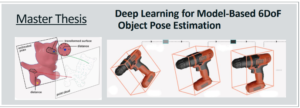
The Augmented Vision Department of DFKI led by Prof. Dr. Didier Stricker is offering a Master Thesis topic for curious and passionate students, who want to develop themselves in advanced Deep Learning and 3D Computer Vision. (More guidance and specifics about the thesis will be discussed in the initial interview)
Main Tasks:
- In-depth literature review of recent 6DoF Object Pose Estimation approaches and review of various datasets [2] used in evaluating these methods
- Developing a novel approach to Object Pose Estimation [1] using recent Deep Learning models such as Transformers [3]
- Extensive experimentation and ablation studies on various Object Pose Datasets and comparison to state-of-the-art approaches
- Potentially submitting a concise paper to a Computer Vision conference
Requirements
- Good knowledge of concepts in 3D Computer Vision and Deep Learning
- High-level experience in Python and PyTorch/TensorFlow
- Previous experience in image rendering / dataset creation software like Blender is beneficial
References (Please go through papers [1] and [2] before the interview)
- Chen, K., Dou, Q.: Sgpa: Structure-guided prior adaptation for category-level 6d object pose estimation. ICCV 2021
- Sundermeyer, M., Hodan, T., Labbé, Y., Wang, G., Brachmann, E., Drost, B., Rother, C., & Matas, J.E.: BOP Challenge 2022 on Detection, Segmentation and Pose Estimation of Specific Rigid Objects. CVPRW 2023
- Vaswani, A., Shazeer, N.M., Parmar, N., Uszkoreit, J., Jones, L., Gomez, A.N., Kaiser, L., & Polosukhin, I.: Attention is All you Need. NeurIPS 2017
Apply latest by: 31.08.2024
Contact:
Sandeep Inuganti, PhD Student
Augmented Vision, DFKI
Trippstadter Straße 122, 67663 Kaiserslautern
Email: sain01@dfki.de
